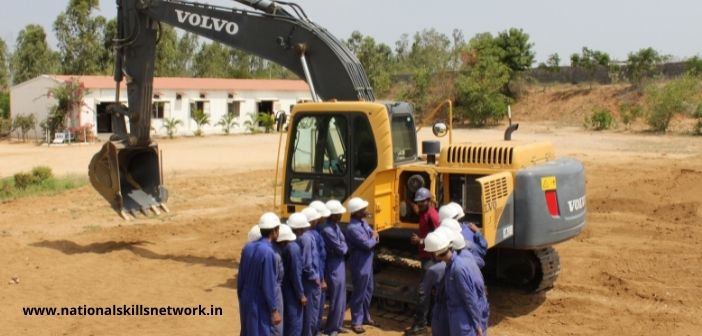 “When we look at various themes under CSR, skill development is always among the top 5 areas”, says Dr. Avanish Kumar, Director – CSR, GMR Varalakshmi Foundation.
“When we look at various themes under CSR, skill development is always among the top 5 areas”, says Dr. Avanish Kumar, Director – CSR, GMR Varalakshmi Foundation.
Corporate Social Responsibility (CSR) has always been one of the prominent ways in contributing towards building a skilled and future-ready workforce. Numerous corporates have been positively impacting the skill training ecosystem in India and it has only been expanding manifold over the years.
One such corporate, the GMR Group of Companies’ CSR wing, GMR Varalakshmi Foundation (GMRVF), has been actively involved in skill training for close to two decades now and is continuing to do so. We conversed with Dr. Avanish Kumar, Director – CSR, GMR Varalakshmi Foundation, Hyderabad to learn more about the importance of skilling, different CSR models in skill development, the scope for apprenticeship adoption in short term courses, and more.
Below are a few excerpts from our conversation. You can watch the full video on our YouTube channel.
Q: How does the CSR model work in offering both government-funded and non-government-funded training programmes?
A: GMR Varalakshmi Foundation is the CSR wing of GMR Group of Companies. Skill training and livelihood empowerment have been important thrust areas for us for a very long time.
Though GMR Varalakshmi Foundation’s first skill training centre was started in 2003, when we saw that skill development was being given a lot of importance by the government, we also wanted to contribute and participate.
Under the government-funded CSR model, GMR Varalakshmi Foundation has been partnering with the government under the Pradhan Mantri Kaushal Vikas Yojana (PMKVY). After successfully completing our application process for the same, we were given CSR Special Project. Today, many companies and organisations are exploring how to become a part of larger companies or ecosystems. Being part of Skill India Mission is one such avenue!
If the training programme is government-funded, we can leverage the resources, have affiliation with Sector Skill Councils, third-party assessments, provide Skill India certificates, etc.
The non-funded training programmes are fully anchored by GMR Varalakshmi Foundation. We partner with other industries who become our knowledge partners and we conduct joint training programmes. Some of our partners are Voltas for Refrigeration, Air Conditioning; Volvo for Excavator Operator Course, etc.
The course is free for our students; however, the fee structure differs based on organisations and their CSR policies. Each of our partners also has its own way of contributing to the programme.

Q: What are some of the challenges in offering short-term skilling, in terms of RPL and post-placement issues, particularly in the present regulatory framework?
A: Even though short-term skill training has been recognized and supported by the government, there are always some challenges.
One of the challenges is choosing what kind of courses would be delivered and achieving the desired targets. There are always gaps between demand and supply. Students tend to choose softer courses like computer-related courses that are easier to learn. But these might not always be in-demand as per the industry. So, we need to choose the courses that youth aspire to learn and the ones that industry demands.
The second challenge is the assessment, which is done by the third party appointed by the Sector Skill Councils. Though it is good, to further strengthen it, the third-party assessment can happen at a common centre approved by Ministry (or any other authority) rather than at the training centre. This will also bring more credibility to the training programmes.
The third challenge is the placements. In the post-placement scenario, most training organisations are able to get good placements. However, many organisations are in the unorganised or informal sector. But currently, the PMKVY scheme stipulates certain kinds of proof of placement that might not be easy to get.
However, we have made a few suggestions that can be used as a substitute. Because they might not always get the offer letter or the payslip to provide as proof.
Coming to Recognition of Prior Learning (RPL), I was personally very happy to see such a scheme being launched by the government. It is because, when we start talking about skilling in India, it is shown that only 3% to 4% of the workforce is skilled. This does not represent the right picture. We have skilled people but not all of them are formally trained or certified. RPL is the scheme that worked well but also needs to get a push from the employers.
Q: What is the scope of adoption of apprenticeships in short-term training programmes?
A: When National Apprenticeship Promotion Scheme (NAPS) was launched with new modifications, it was a welcome move, as it addressed many bottlenecks in the Apprenticeship programme. With that, the government has done its bit, and now the industry needs to gear up. In NAPS, we have less than five lakh apprentices wherein the target was 50 lakhs by 2020, making us far from the target. The government has done many awareness programmes about NAPS but the industry is not yet implementing it fully.
Any industry can promote the optional trades by looking at whatever courses and skills they want to train the students in. They can also start their own short-term training programmes. The scheme is very well designed and everything can be accessed on the portal itself.
There are very few big industries in India that can see the value of apprenticeships. The rest of them are very small to look at the value of on-the-job training. There is still a lot of scope to adopt apprenticeships in skill development training programmes.
Also read: GMR Varalakshmi Foundation (GMRVF) scales new heights with sustained industry collaboration in skill development – https://nationalskillsnetwork.in/gmr-varalakshmi-foundation-gmrvf/
Q: In anticipation of changes in VET, with the Ministry of Skill Development and Ministry of Education coming together, what are your views and roadmap for short-term skilling and pathways for higher qualifications?
A: The National Education Policy (NEP) 2020 is well-anticipated. It talks about blending skill development and vocational education, which is very much needed. The approach of NEP 2020 is also at par with international standards. A multiple entry-exit system is also needed. However, the students will need some time to be aware of this change and adapt to the flexible curriculum.
In 2013, a cabinet note said there would be NSQF uniformity for all kinds of education and in three years, all educational institutions will get government grants only when they follow NSQF uniformity. But this did not happen as per the plan. However, with NEP 2020, all those things which were envisioned 8-10 years back will finally see the light.
Q: Do you wish to share anything else with our audience on the CSR model in skill development?
A: Skilling is one of the significant activities of CSR which can create a good impact in a short span of time. According to various reports, among several themes of CSR, skill development is among the top five. A company can always start its own skill development center or partner with experienced organizations to start the skilling programmes.













